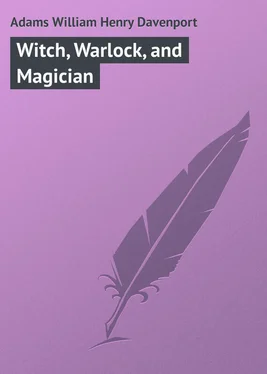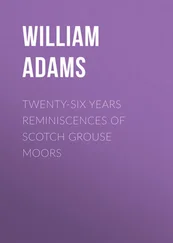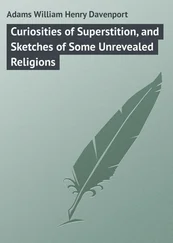William Adams - Witch, Warlock, and Magician
Здесь есть возможность читать онлайн «William Adams - Witch, Warlock, and Magician» — ознакомительный отрывок электронной книги совершенно бесплатно, а после прочтения отрывка купить полную версию. В некоторых случаях можно слушать аудио, скачать через торрент в формате fb2 и присутствует краткое содержание. Жанр: foreign_prose, foreign_language, на английском языке. Описание произведения, (предисловие) а так же отзывы посетителей доступны на портале библиотеки ЛибКат.
- Название:Witch, Warlock, and Magician
- Автор:
- Жанр:
- Год:неизвестен
- ISBN:нет данных
- Рейтинг книги:3 / 5. Голосов: 1
-
Избранное:Добавить в избранное
- Отзывы:
-
Ваша оценка:
- 60
- 1
- 2
- 3
- 4
- 5
Witch, Warlock, and Magician: краткое содержание, описание и аннотация
Предлагаем к чтению аннотацию, описание, краткое содержание или предисловие (зависит от того, что написал сам автор книги «Witch, Warlock, and Magician»). Если вы не нашли необходимую информацию о книге — напишите в комментариях, мы постараемся отыскать её.
Witch, Warlock, and Magician — читать онлайн ознакомительный отрывок
Ниже представлен текст книги, разбитый по страницам. Система сохранения места последней прочитанной страницы, позволяет с удобством читать онлайн бесплатно книгу «Witch, Warlock, and Magician», без необходимости каждый раз заново искать на чём Вы остановились. Поставьте закладку, и сможете в любой момент перейти на страницу, на которой закончили чтение.
Интервал:
Закладка:
Adams W. H. Davenport William Henry Davenport
Witch, Warlock, and Magician / Historical Sketches of Magic and Witchcraft in England and Scotland
The following pages may be regarded as a contribution towards that ‘History of Human Error’ which was undertaken by Mr. Augustine Caxton. I fear that many minds will have to devote all their energies to the work, if it is ever to be brought to completion; and, indeed, it may plausibly be argued that its completion would be an impossibility, since every generation adds something to the melancholy record – ‘pulveris exigui parva munera.’ However this may be, little more remains to be said on the subjects which I have here considered from the standpoint of a sympathetic though incredulous observer. Alchemy, Magic, Witchcraft – how exhaustively they have been investigated will appear from the list of authorities which I have drawn up for the reader’s convenience. They have been studied by ‘adepts,’ and by critics, as realities and as delusions; and almost the last word would seem to have been said by Science – though not on the side of the adepts, who still continue to dream of the Hermetic philosophy, to lose themselves in fanciful pictures, theurgic and occult, and to write about the mysteries of magic with a simplicity of faith which we may wonder at, but are bound to respect.
It has not been my purpose, in the present volume, to attempt a general history of magic and alchemy, or a scientific inquiry into their psychological aspects. I have confined myself to a sketch of their progress in England, and to a narrative of the lives of our principal magicians. This occupies the first part. The second is devoted to an historical review of witchcraft in Great Britain, and an examination into the most remarkable Witch-Trials, in which I have endeavoured to bring out their peculiar features, presenting much of the evidence adduced, and in some cases the so-called confessions of the victims, in the original language. I believe that the details, notwithstanding the reticence imposed upon me by considerations of delicacy and decorum, will surprise the reader, and that he will readily admit the profound interest attaching to them, morally and intellectually. I have added a chapter on the ‘Literature of Witchcraft,’ which, I hope, is tolerably exhaustive, and now offer the whole as an effort to present, in a popular and readable form, the result of careful and conscientious study extending over many years.
W. H. D. A.INTRODUCTION
The word χημεια – from which we derive our English word ‘chemistry’ – first occurs, it is said, in the Lexicon of Suidas, a Greek writer who flourished in the eleventh century. Here is his definition of it:
‘Chemistry is the art of preparing gold and silver. The books concerning it were sought out and burnt by Diocletian, on account of the new plots directed against him by the Egyptians. He behaved towards them with great cruelty in his search after the treatises written by the ancients, his purpose being to prevent them from growing rich by a knowledge of this art, lest, emboldened by measureless wealth, they should be induced to resist the Roman supremacy.’
Some authorities assert, however, that this art, or pretended art, is of much greater antiquity than Suidas knew of; and Scaliger refers to a Greek manuscript by Zozomen, of the fifth century, which is entitled ‘A Faithful Description of the Secret and Divine Art of Making Gold and Silver.’ We may assume that as soon as mankind had begun to set an artificial value upon these metals, and had acquired some knowledge of chemical elements, their combinations and permutations, they would entertain a desire to multiply them in measureless quantities. Dr. Shaw speaks of no fewer than eighty-nine ancient manuscripts, scattered through the European libraries, which are all occupied with ‘the chemical art,’ or ‘the holy art,’ or, as it is sometimes called, ‘the philosopher’s stone’; and a fair conclusion seems to be that ‘between the fifth century and the taking of Constantinople in the fifteenth, the Greeks believed in the possibility of making gold and silver,’ and called the supposed process, or processes, chemistry .
The delusion was taken up by the Arabians when, under their Abasside Khalifs, they entered upon the cultivation of scientific knowledge. The Arabians conveyed it into Spain, whence its diffusion over Christendom was a simple work of time, sure if gradual. From the eleventh to the sixteenth century, alchemy was more or less eagerly studied by the scholars of Germany, Italy, France, and England; and the volumes in which they recorded both their learning and their ignorance, the little they knew and the more they did not know, compose quite a considerable library. One hundred and twenty-two are enumerated in the ‘Bibliotheca Chemica Curiosa,’ of Mangetus, a dry-as-dust kind of compilation, in two huge volumes, printed at Geneva in 1702. Any individual who has time and patience to expend ad libitum , cannot desire a fairer field of exercise than the ‘Bibliotheca.’ One very natural result of all this vain research and profitless inquiry was a keen anxiety on the part of victims to dignify their labours by claiming for their ‘sciences, falsely so-called,’ a venerable and mysterious origin. They accordingly asserted that the founder or creator was Hermes Trismegistus, whom some of them professed to identify with Chanaan, the son of Ham, whose son Mizraim first occupied and peopled Egypt. Now, it is clear that any person might legitimately devote his nights and days to the pursuit of a science invented, or originally taught, by no less illustrious an ancient than Hermes Trismegistus. But to clothe it with the awe of a still greater antiquity, they affirmed that its principles had been discovered, engraved in Phœnician characters, on an emerald tablet which Alexander the Great exhumed from the philosopher’s tomb. Unfortunately, as is always the case, the tablet was lost; but we are expected to believe that two Latin versions of the inscription had happily been preserved. One of these may be Englished as hereinunder:
1. I speak no frivolous things, but only what is true and most certain.
2. What is below resembles that which is above, and what is above resembles that which is below, to accomplish the one thing of all things most wonderful.
3. And as all things proceeded from the meditation of the One God, so were all things generated from this one thing by the disposition of Nature.
4. Its father is Sol , its mother Luna ; it was engendered in the womb by the air, and nourished by the earth.
5. It is the cause of all the perfection of things throughout the whole world.
6. It arrives at the highest perfection of powers if it be reduced into earth.
7. Separate the earth from the fire, the subtle from the gross, acting with great caution.
8. Ascend with the highest wisdom from earth to heaven, and thence descend again to earth, and bind together the powers of things superior and things inferior. So shall you compass the glory of the whole world, and divest yourself of the abjectness of humanity.
9. This thing has more fortitude than fortitude itself, since it will overcome everything subtle and penetrate everything solid.
10. All that the world contains was created by it.
11. Hence proceed things wonderful which in this wise were established.
12. For this reason the name of Hermes Trismegistus was bestowed upon me, because I am master of three parts of the philosophy of the whole world.
13. This is what I had to say concerning the most admirable process of the chemical art.
Читать дальшеИнтервал:
Закладка:
Похожие книги на «Witch, Warlock, and Magician»
Представляем Вашему вниманию похожие книги на «Witch, Warlock, and Magician» списком для выбора. Мы отобрали схожую по названию и смыслу литературу в надежде предоставить читателям больше вариантов отыскать новые, интересные, ещё непрочитанные произведения.
Обсуждение, отзывы о книге «Witch, Warlock, and Magician» и просто собственные мнения читателей. Оставьте ваши комментарии, напишите, что Вы думаете о произведении, его смысле или главных героях. Укажите что конкретно понравилось, а что нет, и почему Вы так считаете.











